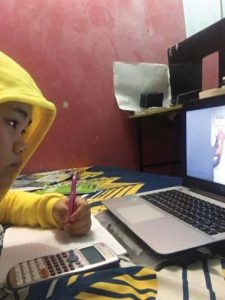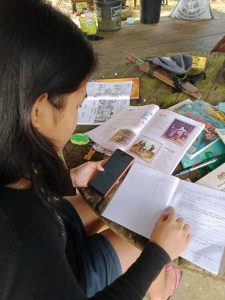Ling Fong
In this article, Ling Fong, a teacher who works with children who are hard of hearing shares her experience of supporting home learning during the COVID-19 pandemic.
Who am I?
Home learning is a new approach for me. As a teacher who teaches students who are hearing impaired, it has been a huge challenge for me to impart knowledge to them remotely. It can be said that I am like a YouTuber, starting out in 2020. My role as a teacher has had to shift to be:

An information technology expert and digital designer
Many teachers had to switch their teaching to run Google Meets, Teams or Zoom during the learning process. These platforms enable two-way communication and teachers can still convey information orally. However, when developing learning activities for deaf children, communication relies on the visual transfer of knowledge. Therefore, teachers need to produce presentation materials in various formats such as PowerPoint, animations or video recordings. Each lesson needs to be planned and organised so that students can get information clearly and accurately.
An entertainer
Teaching is no longer just chalk and talk. Teachers need to be sensitive to the use of different technological media to brighten up the learning environment and attract interest. With home learning, we often wait in front of the screen and expect students to answer or give a response. There can be many reasons why learners may not be interested in following or have access to online teaching.
So, we must work extra hard to keep the students entertained and engaged. I find that my teaching is enriched when I use video footage of me acting as a character as I present the teaching in the form of a story.

A YouTuber
I tried to provide opportunities for the students to show their talent. I avoid learning systems that simply ask them to copy notes or answer exercises. Instead, assessment can be conducted by asking students to practise or apply what they have mastered and giving them full support and trust to express their ideas. If the students have access to mobile phones, engaging with available applications can provide ways to assess learning. For example, to produce animations.
Using drama as a teaching aid
I feel like a director, determining the title of the story, the storyline, the characters, and the venue. Providing learning experiences that rely on visual ways of passing on knowledge has pushed me to face the camera. I record myself using hand gestures and sign language, for teaching and conveying descriptions. But at the same time I have to control the background scenes I use. Each recorded scene needs to be updated with lighting, speed, effects, and volume before being shown to the students. Compared to professional producers, my resource allocation is low. But the only equipment I need to use is a tripod, television screen, laptop, or whiteboard.
Internet access is not a problem for developed and rapidly developing countries. But for countries that are still in development, many rural areas are still having trouble getting internet access. In this COVID-19 pandemic, the economy has also been affected and many people lost their source of income or employment. It has been a burden on every family to bear the cost of internet access, especially for families that have multiple children who are still in school and need to spend a lot on data and/or devices.
Problems are also encountered when students fail to attend, for many reasons, at the time set for face-to-face learning online. Therefore, as well as filming the drama, I am also the editor. I divide the recordings into several episodes, and send each episode to the students using WhatsApp. Short recordings do not require much data for loading and are easier for students to download and open. They can then open the episode they want to watch at any time. So their learning is able to take account of their access to data and their own learning schedules.

Teacher as learner
I do not see myself as a teacher, but a student who learns. I am always learning how to teach, to educate, and to guide. I learn to trust, appreciate and accept from my students. Learn to humble yourself and have a teachable heart. Teachers are not always right. Now education is no longer just about listening to teachers or only about materials and textbooks because students need more knowledge and more so that they can apply knowledge in life. Sometimes the teacher needs to be transformed into a student’s style and listen to the students’ opinions and expressions. Maybe they can also change us so that we can be better.
And I must learn self-discipline by balancing the spiritual, emotional and physical aspects of my life. Life is not just about studying and working. Everyone has a lot of responsibilities and identities. At school we are teachers, but outside of school we can be friends, at home we are parents and children at the same time.
My approach to teaching and learning is successful because I turn to existing technological tools that I find in my context. However, successful learning does not depend on the materials or technological tools we use, but how we make the most of what is available to us.
Ling is a teacher. She can be contacted via the EENET office.
